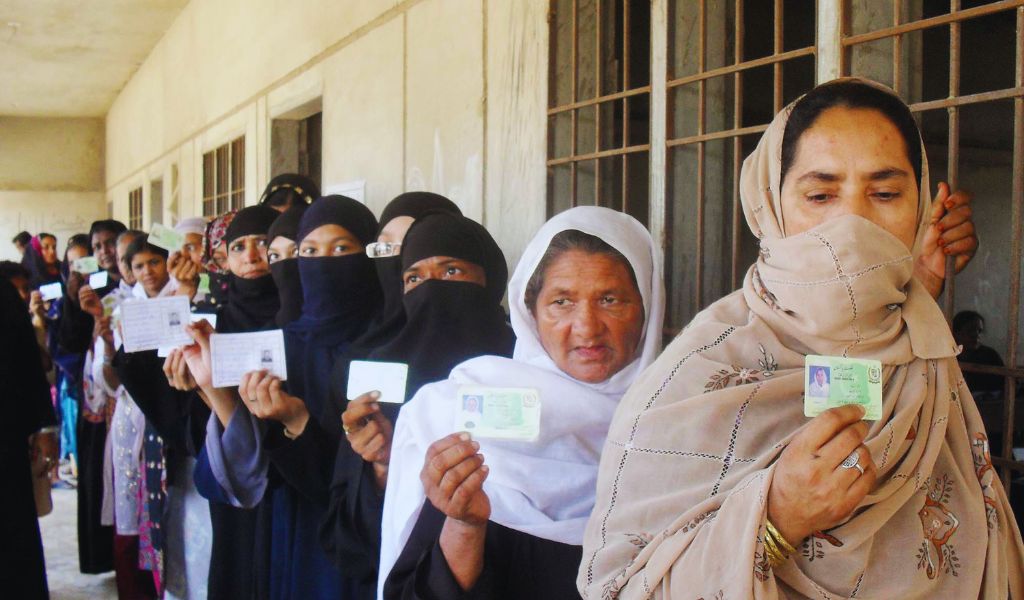The Pakistan general elections come at a pivotal time, with the country facing one of its worst-ever economic crises, record-high inflation, tensions with three out of four of its neighbours (Iran, Afghanistan and India) and another ousted ex-prime minister behind bars.

In its 76-year history, and for most of it a parliamentary democracy, Pakistan has had 29 prime ministers – none of whom have served a full five-year term. Multiple governments have been ousted by military intervention in the past and over the last 20 months, Pakistan’s army has become more visible in politics. Tomorrow, 8 February, the country’s democracy faces its latest trial.
The electoral system
Pakistan is the fifth most populous country with a population of 241 million – out of which 128 million are over 18 and therefore, eligible to vote. Each voter will cast their ballots for two candidates – one for a seat in the federal legislature, called the National Assembly, and the second for one the four provincial legislatures, called the Provincial Assembly.
The National Assembly has 336 seats in total, out of which 60 seats are reserved for women and 10 for non-Muslims. The remaining 266 are elected through direct voting. Victorious candidates become members of the National Assembly (MNA) or members of the Provincial Assembly (MPA), while independent candidates can choose to join any party after elections.
The National Assembly then votes to decide who becomes the prime minister while the Provincial Assembly does the same to select a chief minister. The prime minister then selects their cabinet ministers to form the federal government and the chief minister, a provincial government.
Key players
The two largest parties this election are Pakistan Muslim League (N) (PMLN) and Pakistan Peoples Party (PPP). The first is led by Nawaz Sharif, who has served as the Prime Minister of Pakistan for three non-consecutive terms, each ending with his ousting. PPP is led by former Foreign Minister Bilawal Bhutto Zardari, the son and grandson of late former prime ministers Benazir Bhutto and Zulfikar Ali Bhutto.
The third largest party is Pakistan Tehreek-e-Insaf (PTI) whose members are contesting as independent candidates due to a Supreme Court ruling banning the use of their electoral symbol. This came as part of the crackdown on the party and their leader, former Prime Minister Imran Khan. PTI has also been faced with heavy censorship and restriction from campaigning.
Rural voters
A large majority of voters in Pakistan are based in rural areas. This group’s agency is often dismissed, being categorised as dependent on landlords who become dynastic politicians.
Land reforms and other economic and social changes over the time has made this a dated narrative. IDS Research Fellow Shandana Khan Mohmand‘s work finds that rural voters exercise a fair amount of agency, however, given the weakness of Pakistan’s political parties, this agency is exercised on the basis of kinship.
Women’s political participation
In the last Pakistan election in 2018, 11 million more men than women voted to decide the outcome. Furthermore, women’s electoral participation was 8.5 percent lower in big cities compared to rural areas. Such gendered voting gaps matter because women often look for different policy priorities to support, which tend to be geared towards better welfare outcomes for women and children.
Past interventions to increase women voters tried increasing resources to participate such as information, interest, and civic skills. However, research by IDS Pakistan Hub suggests that increasing women voters’ turnout in Pakistan depends on involving men. Despite 90% of men thinking it is “appropriate” for women to vote in our research, men in households often act as ‘gatekeepers’ and women still depend on men to vote, for example for transport to polling stations.
However, the 2024 election comes after a revival of the women’s movement in Pakistan. The first Aurat March (women’s march) was held in March 2018, a few months before the election in August 2018. Since then, the movement has grown and maintained momentum. Currently, Aurat March Lahore has created a pre-election toolkit series for women voters while Aurat March Karachi and Women’s Action Forum have condemned the court verdict for Bushra Bibi, Imran Khan’s wife – as part of the crackdown on Khan and his party.
Impacts of the feminist movement on women voters in 2024 are yet to be revealed.
Internet shutdowns
The government remains undecided on whether an internet shutdown will be imposed. The caretaker Information and Broadcasting Minister reassured citizens that there will be no suspension of mobile or internet services. While the interim Interior Minister said a shutdown would be considered if there is a security request from a district or a province.
However, as in many African countries, tactics to close down online civic space often cite security concerns as the reason and Pakistan has a history of imposing internet shutdowns. In 2018, the year of the last general elections, people were subjected to at least 11 internet shutdowns.
Furthermore, multiple recent shutdowns have targeted the opposition in this election cycle. In May 2023, amidst violent protests against Imran Khan’s arrest, authorities imposed a shutdown. In December 2023, social media access was blocked and once again, on January 7 2024, another shutdown was imposed to disrupt Imran Khan’s campaign.
However, Khan’s party is still navigating these hurdles, using AI and TikTok to keep the campaign alive.
Voting and results
In the 24 hours leading up to polls opening, candidates are required to stop campaigning. Booths will open from 8 am to 5 pm tomorrow and official results must be announced within 14 days.